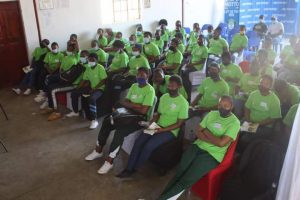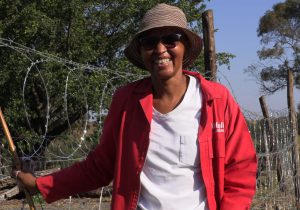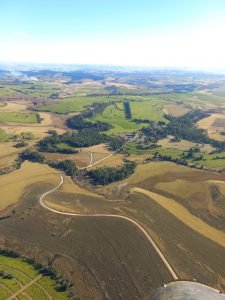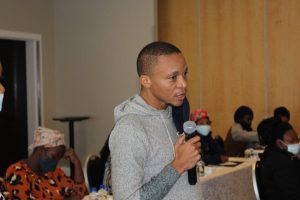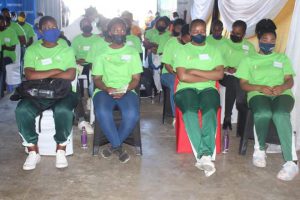

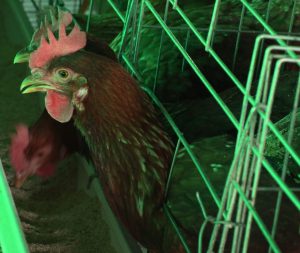
Government intervention becomes lifeline to poultry farm
Government intervention becomes lifeline to poultry farm
WITH South Africa currently experiencing untimely power outages that are attributed to dilapidated electrical infrastructure, many businesses whose operations customarily depend on the availability of electricity have either had to close or suspend sections of their operations to avoid wastage.
It is no doubt that technological developments have come in handy in the improvement of quantity and quality of production; and the agricultural sector which is crucial to both the country’s economy and livelihoods of citizens is one of the key beneficiaries to these advancements.
However, since the dawn of power shedding by the country’s power utility, the sector has suffered immensely with the less equipped developing farmers being the ones who feel the brunt the most.
Pilisa Fadana who runs a poultry farm in Haga Haga where she breeds chicken from electrical incubators to fully grown chicken that she sells to both formal and informal market in the Buffalo City Metro is back on full swing with a renewed hope after her business nearly closed down.
Fadana orders fertile eggs from a Johannesburg-based hatchery and incubates them in her Mhlelisa Farm. In the farm she rears broilers, boschveld, orpington and different breeds of layers.
Her business was on a brink of closure when she was hard-hit by power outages that saw her suspending the chicken hatchery services of her enterprise. But the Department of Rural Development and Agrarian Reform has since given Mhlelisa Farm a lifeline through its Covid-19 relief fund which Fadana used to purchase 230V (5.5 kW) generator that feeds power to both her incubators and six chicken houses.
“Incubators always need to be powered when there are eggs inside and a 5-minute outage can be catastrophic. As much as I can’t remember the loss in figures, but I suffered severely when load shedding was implemented because we’d go two to four hours without electricity. The eggs would be spoiled even the chicks that have just hatched would die from cold while the few that survived wouldn’t grow at the expected rate,” said Fadana.
Fadana further used the disaster relief to reinforce security measures in her farm like CCTV cameras, feed milling machine, razor wire and used the remaining to buy feed.
“Almost all the production machinery in the farm uses electricity –from the borehole that we use for water to incubators, including lighting and heaters in our chicken structures,” she said.
The 54-year-old who hails from Ngcobo ventured into farming on a state-leased farm in 2011 following a horrific car accident in 2009 that kicked her out of her job where she was hired as a banker.
But thanks to her experience in subsistence farming, Fadana had to learn the ropes of the industry and trade at a commercial scale.
With only sheer determination and maternal instincts, she rose to bigger stages and bagged awards in the categories of both emerging farmer and subsistence farmer.
“Being honoured is motivating. It’s a way of saying ‘we see you. And you are on the right track’. Receiving the awards pushed me to work even harder on myself. But being a mother who has nurtured babies into adults has also helped me in the caring of my livestock,” she added.
To this day Fadana is just inches away from clinching life-changing deals of supplying one of the country’s biggest chain stores –a development which she couldn’t dwell much on due to contractual matters.
“The support I have been receiving from the department has brought in consistency in my business as far as production is concerned because now I am never out of stock. I am currently working on adding more chicken structures so I can be able to meet all the demands of the market. I have also managed to negotiate deals to supply some international businesses that are located in East London but the deal is on its infant stages and we are yet to sign on the dotted line,” said Fadana.
The family-run business employs four workers on a permanent basis but with expansion on the cards, Fadana foresees more opportunities.

Magwa pictures
Magwa Tea Estate in pictures

Al-Mawashi reveals developmental
Al-Mawashi reveals developmental plans for EC farming sector
EASTERN Cape farmers of various commodities are set to benefit grandly from the international trading stage facilitated by the Eastern Cape Department of Rural Development and Agrarian Reform and Al-Mawashi South Africa.
Al-Mawashi is a trade and exporting company from Kuwait that began trading in livestock with Eastern Cape farmers in 2019. More than hundred thousand livestock have been shipped to Middle Eastern countries from the East London harbor since Al-Mawashi struck a deal with local farmers with the livestock exported mostly being sheep.
Today [June 23] the company finalized the loading of 56000 sheep and 1000 cattle destined for Kuwait and MEC for Rural Development and Agrarian Reform, Nonkqubela Pieters joined the delegation and witnessed the loading of the herd of cattle at the East London harbor.
With the Eastern Cape being known as the capital of livestock, the international market has opened a channel for both fully-fledged farmers and the developing ones who have been struggling to secure a stable market for their animals.
The trade between Al-Mawashi and Eastern Cape farmers has been around livestock but Al-Mawashi South Africa managing director, Ilyaas Ally has revealed their grand developmental plans for farmers of different commodities in the province.
In an engagement session with MEC Pieters ahead of their shipment, Ally revealed that the Middle Eastern countries have shown interest in locally produced food like vegetables, fruits and honey among others.
“We have been exporting live and chilled meat, but taking into consideration that there aren’t much farmlands that side, 90% of their food is imported. And we are exploring to diversify with the above as we have seen the growing interest and demand for them,” said Ally.
He added that they will be embarking on a drive to uplift developing farmers across the six districts in the province. This done together with Department of Rural Development and Agrarian Reform, ECDC and ECRDA
The partnership will see Al-Mawashi signing offtake agreements with two emerging farmers each district and this will help farmers to access credit as the deal will guarantee them a sale of 3000 livestock a year.
“There is a lot we are planning for the Eastern Cape and everybody is set to benefit and we will be going on a roadshow soon if the covid 19 regulations allow,” he said.
In each shipment of the livestock, Al Mawashi spends at least R150 million in the province and some of the beneficiaries include livestock feed producers as the company utilizes 30 000 tons of feed in its four shipments a year.
MEC Pieters pledged the department’s support to the strategic partnership and said the interest shown by the Middle Eastern countries to Eastern Cape agricultural commodities would spark an interest in diverse farming and make locals realize the value of land.
“Government continues to encourage people to work the land and actively partake in local and international trades. These developments greatly contribute in growing the economy of this province,” said Pieters.
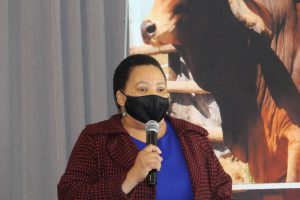
Empowering Youth in Agriculture
Empowering Youth in Agriculture
As we draw a close towards the youth month , the departmental special programmes unit’s youth desk coordinator Ms Vuyo Roloma working together with sister departments and government agencies like NYDA converged in Western district to engage and inform young people about the opportunities available in the various organisations
Welcoming the delegates, Mr Nyokana District Director in the Western Region said ” The department continues to support young people and this is evident through the formation of youth in agriculture (YARD) in 2016. This has created a platform for young people to make their mark in the agricultural space by attaining awards from Provincial and National Competitions.
Mrs Manitshana, Director for Special program advised the youth to apply in the recent advert issued by the department.
” Through the National grant funding like CASP for infrastructure, Ilima Letsema for food security and Siyazondla young people are supported “concluded Manitshana
Agricultural graduates are also placed in commercial farms for a 24 months period and are encourage to finish the two years with a business plan were they are able to start their own business.
Siyabulela Zondani from NYDA and Zungu Mene from DEDEAT also shared the support they provide and how young people can access the information.
Key challenges raised by the youth
- Land ownership
- Assistance in filling the application forms for funding
Replying on behalf of young people in the region Thulethu Nombona , appreciated the opportunity that has been given to them.
He promised that they will spread the word to those who were not able to attend, she also added that “as young people were are capable of making this sector fashionable and we are going to do our best with the opportunities given to us”


